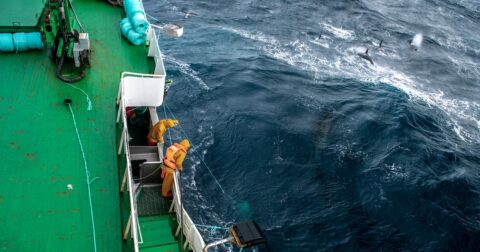Solutions
How Food Banks Prevented 1.8 Million Metric Tons of Carbon Emissions Last Year
Climate•5 min read
Perspective
We spoke with Pulitzer Prize winner Ian Urbina and investigators Lex Rigby and Pete Paxton about their experience documenting the commercial fishing industry.

Perspective • Climate • Oceans

Words by Laura Bridgeman
This month’s Sentient Sessions brought together a panel of seasoned investigators to discuss the hows and whys of capturing stories on the seas. Ian Urbina, Pulitzer Prize winner and Director The Outlaw Ocean Project, Lex Rigby, Head of Investigations at Viva!, and Pete Paxton, whose work has been covered in HBO documentaries, were joined by Sentient Media’s Executive Director Ana Bradley and Reporter and Editor Matt Zampa.
“Life at sea is space travel on earth.” This is what Ian Urbina said when asked what it’s like to report on the oceans and what inspires him to continue. Reporting on the ground—or in this case, on the water—can help bring a critical perspective to issues that are often difficult for the public to see. A clearcut forest is far more visible when compared to a seafloor devastated by bottom trawling, even though the effects are similar and both activities are similarly widespread.
This is why compelling visual and narrative storytelling of oceanic issues, whether human rights abuses or overfishing, is so important.
One of the biggest challenges with marine reporting is riveting people’s attention onto animals who don’t frequently get the spotlight. It’s far easier to get stories placed and laws changed when it comes to seals or dolphins, animals who possess that all-important “cute” factor. For other species, like salmon or Chilean seabass, public sentiment tends to run cooler even though these fish, and the people catching them, are often being exploited.
Good reporting lets the public understand how to think about the issue, giving consumers an idea of what role they play and empowering them with the knowledge of the influence they wield. Despite the many challenges, reporting at sea is as critical as ever.